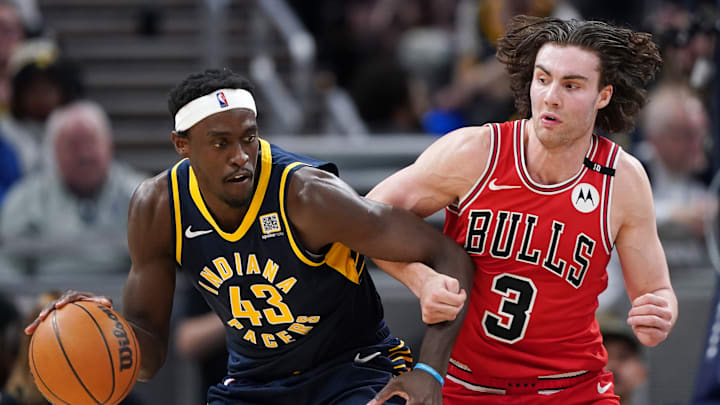The Chicago Bulls and Josh Giddey are at a crossroads. Giddey, now approaching his second contract, is determined to secure the deal he feels he’s earned. The deal averages $30 million annually, which is in line with what starting point guards typically earn in the modern NBA.
Unfortunately for Giddey, he's a restricted free agent. Thus, he has no bargaining power. Salary cap space has dried up league-wide. No rival team can offer the 6-foot-8 point guard even a modest sum. Consequently, Giddey is left with two options. Sign the one-year, $11.1 million qualifying offer or come to a compromise with the Bulls, who have reportedly only offered a contract in the $20 million range.
Josh Giddey’s contract conundrum comes with plenty of variables
Option No. 1 is risky for both sides. If Giddey exceeds expectations, he'll be owed far more than $30 million annually, especially with the salary cap on the rise. Moreover, he might not even want to re-sign with the Bulls if this offseason's negotiations don't net him a long-term deal. Conversely, if Giddey severely underperforms or gets injured, he may have to settle for a short-term prove-it deal next year.
A compromise is the best solution for both parties. The Bulls secure their 22-year-old point guard of the future, while said point guard lands a life-changing payday.
Still, this crossroads isn’t solely the result of limited cap space. Like fellow restricted free agents Quentin Grimes, Jonathan Kuminga, and Cam Thomas, Giddey carries noticeable flaws in his game.
The former sixth-overall pick has struggled as a shooter for much of his career. He shot merely 31.0 percent from three-point range in his first three seasons with the Oklahoma City Thunder. However, he upped his efficiency to 37.8 percent from downtown in his first season in Chicago. Nonetheless, while his uptick in efficiency was commendable, it came on only 4.0 attempts per game. There's still room to grow.
Another concern that often comes up is Giddey’s questionable defensive ability. Aside from his rookie season, Giddey's teams have been better defensively with him off the floor—especially when it comes to forcing turnovers and defending the basket.
Giddey's defense is better than advertised
Yet, Giddey isn’t quite as poor a defender as he’s often made out to be. While his teams have generally fared better defensively with him off the floor, the difference has been minimal. For instance, the Bulls were 1.5 points per 100 possessions better defensively with Giddey off the court, but nearly 3.0 points per 100 possessions better with teammate Coby White on the bench.
Giddey's perceived defensive limitations typically stem from the Aussie being a substandard athlete. While true in an isolation sense, Giddey is a relatively strong team defender. First and foremost, he's big, at 6-foot-8 with an even wingspan.
When discussing Giddey and his contract situation on The Game Theory podcast, NBA pundit Sam Vecenie said, "Being 6-foot-8 gives you so much flexibility to be able to play … against weaker opponents. And, it gives [Giddey] a lot of leeway when playing recovery."
Vecenie is right. His role as the Bulls’ point guard doesn’t necessarily translate to guarding opposing lead guards. Last season, Giddey spent the most time defending Tobias Harris, Luka Doncic, Jaden McDaniels, Andrew Wiggins, Josh Hart, and Franz Wagner. All aforementioned players fall between 6-foot-5 and 6-foot-9. Giddey rarely defended point guards, and when he did, it was against Doncic, Cade Cunningham, and others of similarly tall stature.
When evaluating Giddey’s one-on-one defense, it’s tough to identify which position he guards most effectively. He held Wagner to an 18.2 percent clip on 2-of-11 shooting. However, Pascal Siakam converted 8-of-10 field goals against Giddey. Both Wagner and Siakam are similar on offense to a degree, yet saw vastly different results going against the Australian point guard.
Listed as a guard on NBA.com, Giddey was middle-of-the-pack in field goal differential. Opponents shot 1.1% better when guarded by Giddey—83rd among 169 players with at least half a season’s worth of games.
Giddey's defense is by no means a selling point, but it's not nearly as bad as it's made out to be. Lastly, upon analyzing Giddey's defense, CraftedNBA offers 10 player comparisons based on a myriad of advanced defensive analytics, such as deflections per 36 minutes, rim defensive field goal differential, and versatility rating. Giddey's fifth-most similar comparison was Trey Murphy III—a generally respected and even lauded defender.
